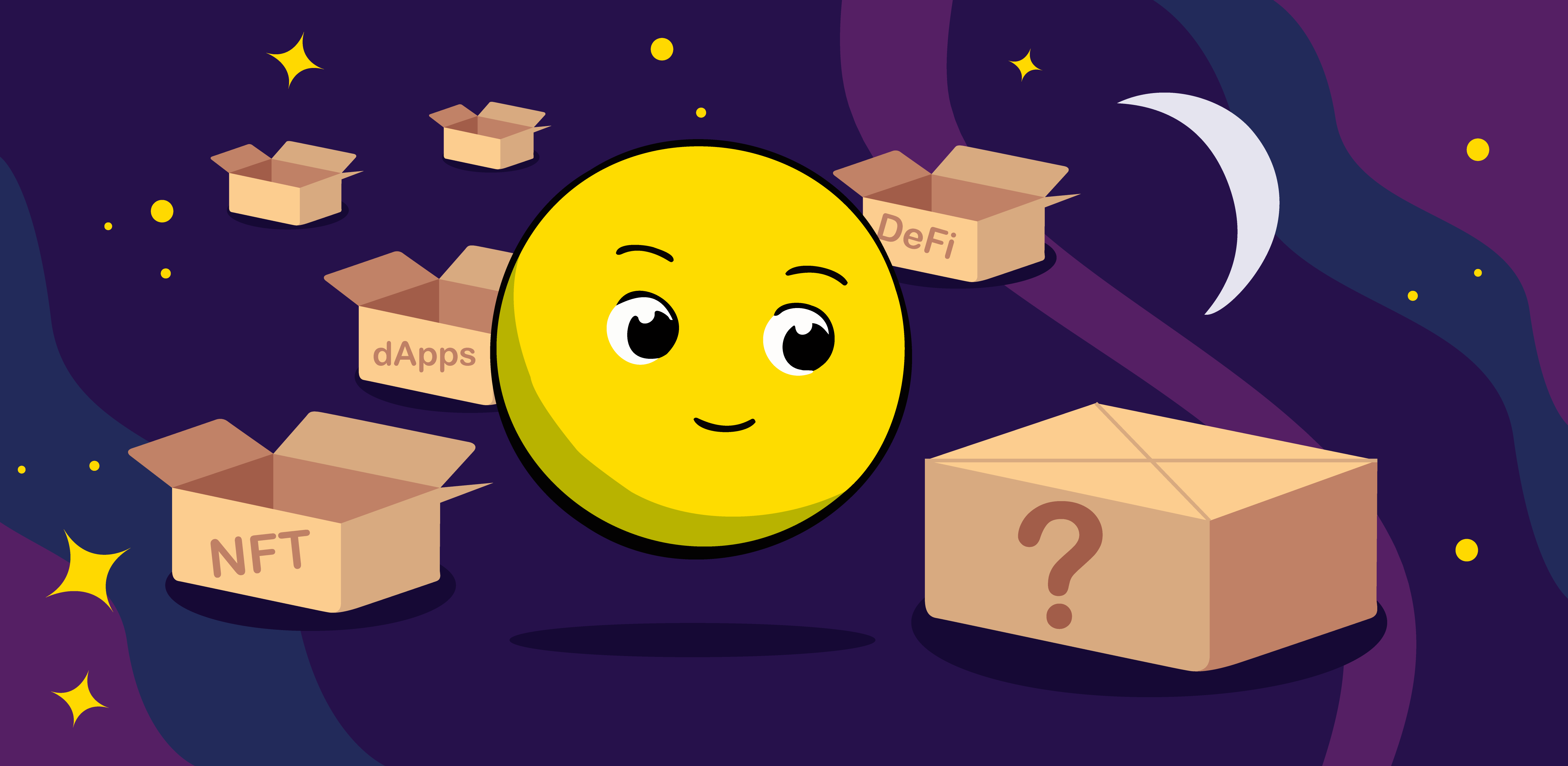
Understanding Blockchain Naming Services
A blockchain domain is a decentralized domain address that operates based on a distributed registry technology. Instead of using traditional centralized systems, such as the ICANN, blockchain domains operate based on decentralized networks.
Using blockchain technology, domain names are transformed into digital assets that can be transferred, sold, or inherited without the participation of intermediaries. The blockchain domains also provide improved security, privacy, and censorship resilience capabilities.
Blockchain domains are used to replace public cryptocurrency addresses, which are combinations of 20 or more characters, with simpler "names,” for example, cp-media. eth.
Because of this, cryptocurrency transactions are carried out without using standard addresses but on specific domain names owned by companies or individuals, which minimizes the risk of errors.
Decentralized domains are available in the largest Bitcoin and Ethereum blockchain networks, as well as in several others – Handshake, EOS, Waves, Blockstack, and others. The use of blockchain domains is already supported by more than two dozen cryptocurrency wallets, including the most popular of them – MetaMask, Trust Wallet, Atomic Wallet, Opera Wallet, Coinomi, MyEtherWallet, and many others.
Overview of the Traditional Domain Name Systems (DNS)
There was a time when information on the Internet could only be found by typing the IP address. Then, Domain Name Service (DNS) appeared. It provided a balance between the complexity that computers need and the simplicity that humans demand.
Computers only understand IP addresses and DNS allows one to associate a domain name with an IP address. Thus, when you want to go to a page, you can enter the domain name, and DNS will take care of translating it to the appropriate IP address and transfer it to the computer.
DNS is often referred to as the Phonebook of the Internet. However, it has several limitations including centralization, security risks, and privacy concerns. To address these issues, blockchain domains have gained popularity and are continuing to do so.
ICANN, a nonprofit organization based in the United States, controls the distribution of domain names, exerting a subtle yet significant impact on the Internet.
DNS data are organized by ICANN and managed at two levels: the root level, managed by registries, and the second level, managed by registrars.
Currently, domain name 'owners' do not truly own their domains; instead, they must rent them from major industry players like GoDaddy, Namecheap, and Google. This system is relatively insecure, lacks privacy, and grants these firms significant control over the Internet.
Traditional domains are susceptible to DDOS attacks, which can temporarily disable websites by overwhelming them with Internet traffic. These attacks are typically carried out by bot farms or botnets, which are computers hijacked by unsuspecting individuals.
DDOS attacks on individual websites can harm users and companies, but they can also threaten registrars and ICANN, potentially damaging the entire Internet.
Evolution to Decentralized Naming Systems on the Blockchain
Blockchain Naming Service is a system that allows users to associate human-readable names with long, complex blockchain addresses.
Instead of memorizing a long string of random characters, users can create and register names that can be used to identify their addresses. For example, instead of sending cryptocurrency to the address 0×5aAEB6053F3E94C9b9A09f33669435E7Ef1BeAed, the user can send it to the address ’’, 'myusername.crypto'.
The benefits of using a BNS are convenience, ease of use, and added security. Users are less likely to make mistakes when sending and receiving cryptocurrencies using a name that is easier to remember and use. In addition, the BNS can help protect against phishing attacks by allowing users to ensure that they are sending funds to the correct address.
Types of Blockchain Naming Services
Generic Naming Services
Generic BNS platforms, such as the RIF Name System (RNS), enable the registration and resolution of blockchain domain names, paving the way for decentralized Web 3.0. These platforms offer a wide range of functionalities including payment resolutions, internal fund transfers, and resource locators on the blockchain.
Specific Blockchain Naming Services
In addition to generic BNS, specific blockchain-naming services are tailored to the needs of various blockchain networks and applications. These services play a crucial role in enhancing the user experience and security of blockchain-based systems.
How Blockchain Naming Services Work
Blockchain Naming Services operate by associating unique domain names with specific blockchain addresses or content, thereby allowing users to access digital assets using human-readable names. This process involves the registration of domain names on the blockchain, which is secured through cryptographic techniques and smart contracts.
Key Features of Blockchain Naming Services
Blockchain domains such as. x and. Crypto has a wide range of advantages, including:
- One-time registration/perpetual ownership: Once a buyer purchases an NFT domain, they will never have to buy it again without having to pay any renewal fees. They own it forever unless they decide to transfer it to another person.
- Constant availability: Unlike traditional registrars and web hosts that experience outages from time to time, blockchain domains have (so far) been fully accessible without downtime. This is because hosting websites on a peer-to-peer network ensures that the websites are available 24/7.
- Simple Cryptographic Payments: Blockchain domains allow domains to function as wallet addresses so that people can easily send funds to an easy-to-remember domain instead of a confusing public address. While different blockchain domain providers vary, users using Unstoppable Domains can send and receive 276 different types of cryptocurrencies.
- Data integrity: Blockchain domains are almost impossible to damage because blockchains use reliable cryptography and reach a consensus using distributed node operators instead of a single centralized authority. This means that the DNSSEC key update
- Censorship resistance: Unlike traditional domains, blockchain/NFT domains cannot be disabled or blocked using traditional methods often used by oppressive corporations and governments.
- Enhanced Security: Blockchain technology adds an additional layer of security to the domain, making it virtually impossible to hijack or steal, especially through brute force hacking techniques that are often used to hijack or steal traditional domains.
- Privacy and Confidentiality: NFT domains provide significant privacy compared with traditional domains. Only the public address of the domain owner is known.
- DApp Support: NFT domains have built-in support for dApps, which makes them easier to use and less buggy.
Disadvantages of Blockchain Naming Services
However, there are potential disadvantages in blockchain domains. This includes:
- Limited Usage/Branding Issues: NFT domains are extremely new, so they cannot be trusted or used outside of the crypto and blockchain ecosystem. This implies that it may be useless for companies and individuals using blockchain domains to use these domains outside the crypto community.
- Web Hosting Issues: Hosting sites in blockchain domains can be problematic. Currently, there are a limited number of hosting services that can host sites in blockchain domains, and all of them must use the Interplanetary File System (IFPS).
- Limited browser support: In many browsers, blockchain domains are not automatically supported. Currently, major browsers, such as Firefox and Chrome, require users to install a plugin to access the blockchain domain. However, this may soon change, as these domains will potentially become more popular. Popular plugins for blockchain domain names include FriGate, Blockchain DNS, and PeerName.
- Use for criminal purposes. While the fact that corporations and governments cannot censor NFT domains is generally considered a boon, they can also be used by cybercriminals, such as those selling drugs, weapons, and, perhaps most often, stolen user data. One major website, Joker's Stash, uses the blockchain domain to sell stolen credit and debit card data.
Use Cases and Applications
In addition to making cryptocurrency transfers, blockchain domains can be used for the following purposes:
- Development of Decentralized Applications (dapps). Blockchain domains simplify interactions with smart contacts and dApp content by providing decentralized control and management capabilities.
- Creation of decentralized websites. Blockchain domains provide censorship resistance and high security for decentralized sites, protecting content and user identification data using cryptography.
- Protection of trademarks and intellectual property. Blockchain domains can be used to register and protect trademarks and other property rights in a decentralized environment.
- Domain investment and speculation. Blockchain domains can be used for investment and speculation in the domain name market as they are digital assets that can be transferred, sold, and acquired.
Challenges and Considerations
Blockchain domains offer many important benefits to all crypto market participants, but there are also potential problems and limitations associated with their use.
- Limited compatibility. Most traditional browsers and applications do not support blockchain domains by default, which makes it difficult to access decentralized sites and applications.
- Users often need to use specialized plugins or browsers because of the complexity of the technology. Blockchain technologies can be difficult to understand and use, particularly for novices. This can make it difficult to manage the domains and develop decentralized applications.
- Speed and scalability. Blockchain networks have speed and scalability limitations, which can affect the performance and stability of decentralized sites and applications.
- Legal and regulatory issues. Depending on jurisdiction, governments and regulators may restrict or prohibit the use of blockchain domains. This could create legal uncertainty for domain owners, developers, and business representatives.
- Security issues. Fraudsters are constantly improving social engineering attacks to gain control of private keys, while hackers are constantly looking for vulnerabilities in cryptography.
- Lack of centralized support. Unlike traditional domain names, blockchain domains do not have centralized registrars, which limits access to technical support and the resolution of user issues.
- Adaptation and implementation. Although blockchain domains offer innovative opportunities, their widespread adoption and implementation may take some time, as they compete with the well-established infrastructure of traditional domain names.
Future Developments and Trends
It should be noted that the blockchain domain sphere is in the initial stage of development. It is still a relatively small market, but the technology is actively gaining popularity, especially among people who value privacy, work in blockchain technology, and are interested in cryptocurrencies. Therefore, in the foreseeable future, we should expect further development and mass adoption.
Blockchain Naming Services represent a significant leap forward in the evolution of the Web, offering a decentralized, secure, and user-centric approach to digital asset identification. With the potential to transform the way we interact with the Internet, BNS is set to play a pivotal role in shaping the future of the digital economy and the blockchain ecosystem.
As technology continues to advance, businesses and individuals alike stand to benefit from the enhanced security, interoperability, and user experience offered by Blockchain Naming Services.




